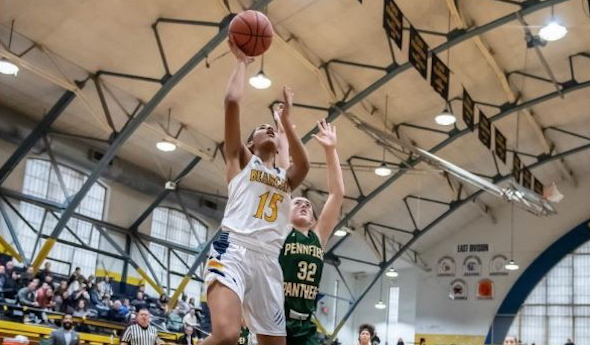
Hoops Finds Annual Home During Holidays
December 27, 2019
By Ron Pesch
Special for Second Half
Nothing says the Holidays like a high school basketball tournament.
It started, like many things do, with a drip. Well, make that a dribble.
The Michigan High School Athletic Association has allowed Holiday basketball tournaments for years. When was the first? That’s hard to establish. No one really kept track of such. A 1934 Wakefield News article indicates that a “Christmas Tournament will be held for the (Gogebic) Range teams at Wakefield December 27 and at Ironwood December 28.” Hurley, Bessemer, Ironwood and Wakefield were entered in the “blind” tournament, with opponents drawn just before game time. It was a new idea, at least in the Upper Peninsula.
“Nothing of its kind has ever been attempted in the Peninsula before,” stated the Ironwood Daily Globe. The tournament, won by Hurley, was a financial success. After expenditures, including the purchase of trophies, profit equaled enough that $22.42 was distributed to each school competing in the tournament. Plans were announced to bring back the tournament in a larger format the following year. It did return the following December, with the same teams in the same format but with all games played in Wakefield. This time out, Ironwood topped Hurley 22-21 for the tournament title.
In the Lower Peninsula in 1935, an All-Berrien County Holiday tournament was held Dec. 26, 27 and 28, with Three Oaks winning the Class B-C division title, 15-13 in the final over Berrien Springs. St. Joseph Catholic emerged as the Class D victor with a surprising 27-26 win over the reigning MHSAA state champ from Stevensville. The 14-team competition was played at Niles High School. Attendance was “slim, very slim” for the opening day of the tourney. The event did not return in 1936.
A similar, but much smaller, event was staged in Berrien County in 1941 with the Bridgman Class C Invitational. The tournament featured seven teams with contests spread over three nights. It was a success.
“Some 450 paid admissions were checked in Wednesday night for the championship finals, which Bridgman won from Berrien Springs. … The total paid admission for the three night event was 1,420 fans with a gross gate of approximately $400.”
By the mid-1940s, the idea of playing prep basketball during the Christmas lull had begun to take off across the state.
In December 1946, before a crowd of 1,500 at the Flint IMA Auditorium, Holland, the reigning Class A champion, downed Flint Northern 51-48 behind a pair of late field goals by Ken ‘Fuzz’ Bauman in the first annual Motor City Invitational. In Jackson, Detroit Catholic Central won the Michigan Catholic Invitational, beating Kalamazoo St. Augustine, 42-40. Bridgman again snagged the title at the Sixth Annual Berrien Class C Christmas Holiday Tournament. It was the Bees’ third Christmas championship in four years. The Little Eight Conference Holiday Tournament was played across four school gymnasiums as the calendar transitioned from 1946 to 1947. Bangor downed Covert, 34-29, in the championship contest hosted at Watervliet High School on Saturday, Jan. 4.
“Holiday tournament basketball has really caught on in Michigan,” said Hal Schram in the Detroit Free Press in 1947. “There will be no Christmas-New Year’s rest for at least 60 Michigan high school squads which have jumped at the chance to sharpen their collective shooting eyes for the long season ahead. … At last count, tournaments will be played between Dec 17 and Jan 3 at Flint, Saginaw, Grand Rapids, Jackson, Lincoln Park, Fremont, Negaunee, Marquette, Benton Harbor and Detroit.”
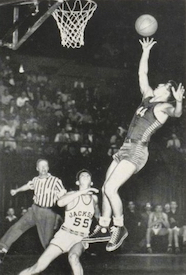 The same eight schools that played at the first Motor City tournament – Jackson, Grand Rapids Central, Holland, Muskegon Heights, Monroe, Midland, Flint Central and Flint Northern – were invited back for the second year. According to Schram, “Not a single participating school of a year ago wanted to be left out.”
The same eight schools that played at the first Motor City tournament – Jackson, Grand Rapids Central, Holland, Muskegon Heights, Monroe, Midland, Flint Central and Flint Northern – were invited back for the second year. According to Schram, “Not a single participating school of a year ago wanted to be left out.”
Jackson downed Flint Northern in the title game, 39-34.
The Saginaw Invitational, hosted at Arthur Hill High School, boasted six Class A schools as well as Alma and Mount Pleasant, both Class B schools. Mount Pleasant surprised the field, winning the tournament with a 40-25 triumph over Dearborn Fordson in the championship game.
A year later in December, Schram wrote, “The Michigan High School Athletic Association wasn’t caught unaware when the tournament bug started to bite every sector of the state.”
“Never did we expect such a wave of tournament play as we will see during the next three weeks,” said Charles Forsythe, state director for the MHSAA, noting 34 Christmas vacation tournaments were scheduled between December 15 and January 8 during the 1948-49 basketball season. “Perhaps we’re lucky at that. The Oklahoma association has had to sanction 123 tournaments.”
Forsythe and Schram explained the reasons for the wave of popularity. Of particular interest was the fact that, at the time, a school sponsoring both football and basketball could play a total of no more than 24 games, combined, in the two sports. However, MHSAA rules allowed a basketball team the chance to play as many as three games during a Holiday tournament and be charged with only one of its allotted combination of 24 contests. (The MHSAA rules changed prior to 1972-73 to allow basketball teams a maximum of 20 games.)
Coaches could keep their squads sharp during the two-week layoff with games rather than just mandatory practices. And, as a bonus to all because tournaments were financed through gate admissions, invitations to larger tournaments meant teams got to “stay and eat at the best hostelries, go on sightseeing tours when not playing and play non-conference opponents from other sections of the state.“
Add in the chance to play before larger-than-normal crowds, and the formula for a successful tournament was cast.
Beginning with the 1950-51 season, the football-basketball rule was altered to count play in mid-season invitational tournaments as two contests. With the change, according to the Detroit Times, “the number of such meets dropped sharply.”
Only nine Holiday tournaments, involving 50-plus teams, were recorded by the MHSAA during the 1951-52 season: the 5th annual Flint Parochial Invitational, the Alpena Catholic Invitational (involving 16 teams), the 5th Annual Greater Lansing Invitational, the Albion College Invitational, the Twin-Five Conference Christmas Tournament (a 10-team replacement for the disbanded Little Eight Conference’s tournament), the Otisville Invitational, the Columbiaville Invitational and the 1st Annual Portland St. Patrick Christmas Invitational.
But by the 1960s, Holiday Tournaments were again regaining popularity, with more now focused on teams from a specific community or section of the state, especially among smaller schools.
The St. Patrick tournament was still going strong in 1966 – its 15th year – with an eight-team, four-day design. Williamston downed a Cinderella squad from Carson City, 64-44, before 1,100 fans at Portland to earn the championship. Other Mid-Michigan holiday tournaments played out in Chelsea and Swartz Creek at the same time.
The Flint Parochial League Tournament was a mainstay of the Holiday season until the breakup of the league in the early 1970s.
“Basketball tournaments have become popular around the state and nation in recent years,” wrote Wendy Foltz, longtime Battle Creek Enquirer sports editor, before the kickoff of the inaugural Battle Creek Central Holiday Cage Tournament in 1968. In a twist that harkened back to earlier days, the eight-team event represented nearly every section of lower Michigan. “Battle Creek never has been a rabid basketball town like some around the state,” added a hesitant Foltz, noting a hope that the event could at least break even.
Hosted at the Cereal City’s historic Fieldhouse, built in 1928, that first tournament was won by host Battle Creek Central, which downed Traverse City 71-53 before a crowd of 2,000. Phil Todd led the Bearcats with 29 points, including 21 in the first half, while 6-foot-8 Tom Kozelko paced TC with 24. Muskegon Heights won the consolation game, holding off a late Ypsilanti Willow Run rally, 78-77. Other schools competing were Battle Creek Lakeview, Grand Blanc, Romulus and recently-opened Jackson Lumen Christi.
Chuck Turner, Central’s head coach, and junior varsity coach Jack Schils had contacted 60 schools during the summer of 1967 to organize the 12-game schedule.
“The response was terrific,” said Schils, who added, “Many schools could not accept because of schedule commitments but want to enter a year hence.”
The Battle Creek tournament was back in 1969, again hosting teams from near and far. Schils noted that cost ran high when teams were brought in from long distances: “However, this type of tournament is highly desirable so we hope fans will support it.”
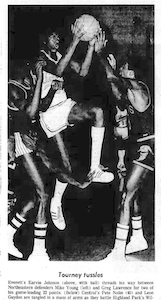
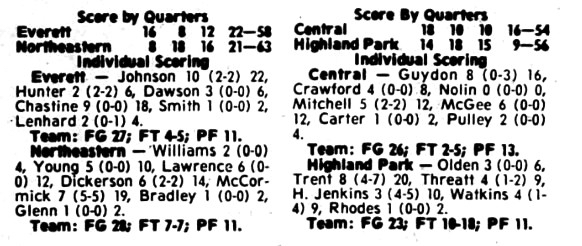 But the event was discontinued following the 1970-71 season when the “eight team format became too unwieldy,” according to the Enquirer “… and both crowd and the quality of play declined.”
But the event was discontinued following the 1970-71 season when the “eight team format became too unwieldy,” according to the Enquirer “… and both crowd and the quality of play declined.”
Pared down to a four-team format, it returned in a big way in December 1975. The tournament saw standing-room-only crowds of more than 3,000 for games between Battle Creek Central, Detroit Northeastern, Class A quarterfinalist Lansing Everett and reigning Class A champion Highland Park.
Detroit Northeastern downed Lansing Everett, 63-58 for the Cereal City championship trophy. Everett junior Earvin Johnson scored 22 points and, with teammate Reggie Chastine, was named to the all-tournament team along with Northwestern’s Wilbert McCormick, the tourney MVP, and his teammate Greg Lawrence. Highland Park’s William Trent and Battle Creek Central’s Leon Guydon also were named to the team.
By the 1980s, it seemed that the Christmas break nearly mimicked March in Michigan.
“I think a Christmas tournament really helps your program,” said Turner in 1980 to the Enquirer. He had taken over the head coaching position at Battle Creek in the fall of 1967 after a successful stint at Willow Run. “I don’t understand basketball teams having a preseason, playing three or four games, then taking two weeks off. When you get back, it’s like starting over.”
Besides Turner’s squad, the 1980 field included Detroit Western, Detroit Murray Wright and eventual winner Kalamazoo Central. The event would ultimately be re-christened the Battle Creek Central Chuck Turner Holiday Classic.
“The late Chuck Turner started bringing big games to the city over the holidays when he first started at the school in the 1960s,” wrote Bill Broderick in the Enquirer in 2018.
“Chuck started this because he wanted to give people the chance to come back home for the holidays and see everyone play. It’s been like a family reunion over the years,” Fred Jones told Broderick. Jones was a longtime assistant to Turner. “That we can keep it going in his name is great and hopefully we can keep if going for another 50 years.”
The girls are now part of the action. All five Battle Creek city schools – Central, Pennfield, Harper Creek, Lakeview, and St. Philip – were part of the event in 2018.
This year the Chuck Turner Central Field House Holiday Classic will again span two days – December 27 and 28 – and will again see all five city schools play on the historic floor.
Other Holiday tournaments scheduled this year include:
Petoskey Invitational – December 13-14
Raider Shootout – December 21
18th Annual Muskegon Area Sports Hall of Fame Classic – December 27
Earl McKee Classic – December 27-28
North Farmington Holiday Extravaganza – December 27
Motor City Roundball Classic – December 27
Cornerstone Invitational – December 27
Washtenaw Hoops Showcase – December 28
 Ron Pesch has taken an active role in researching the history of MHSAA events since 1985 and began writing for MHSAA Finals programs in 1986, adding additional features and "flashbacks" in 1992. He inherited the title of MHSAA historian from the late Dick Kishpaugh following the 1993-94 school year, and resides in Muskegon. Contact him at [email protected] with ideas for historical articles.
Ron Pesch has taken an active role in researching the history of MHSAA events since 1985 and began writing for MHSAA Finals programs in 1986, adding additional features and "flashbacks" in 1992. He inherited the title of MHSAA historian from the late Dick Kishpaugh following the 1993-94 school year, and resides in Muskegon. Contact him at [email protected] with ideas for historical articles.
PHOTOS: (Top) The Battle Creek Central and Pennfield girls face off during the 50th Chuck Turner Classic. (Middle) Shaheen Shaheen scores two points for Flint Northern, which fell to Jackson 39-34 during the 1947 Motor City championship game. (Below left) Lansing Everett’s Earvin Johnson makes a move toward the basket against Detroit Northeastern during the 1975 Battle Creek event. (Below right) Box scores from the 1975 tournament include Johnson’s 22 points in the 63-58 loss. Photos courtesy of the Battle Creek Enquirer, Lansing State Journal and Ron Pesch archives.)
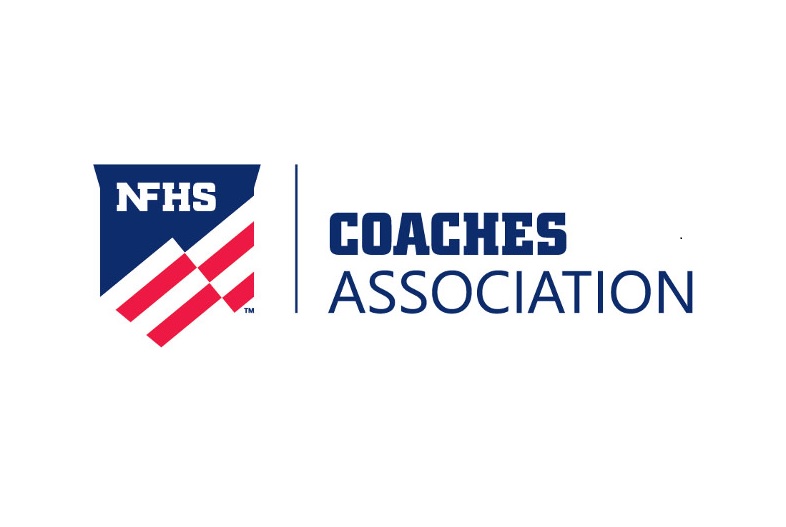
Michigan Leaders in 3 Sports Earn National Honors from NFHS Coaches Association
By
Geoff Kimmerly
MHSAA.com senior editor
January 16, 2024
Detroit Cass Tech boys basketball coach Steve Hall, Farmington Hills Mercy girls golf coach Vicky Kowalski and East Grand Rapids girls swimming & diving coach Butch Briggs and have been named a 2022-23 National Coach of the Year in their respective sports by the National Federation of State High School Associations (NFHS) Coaches Association.
They were selected by a committee including representatives from all eight NFHS sections – Michigan is part of Section 4 with Illinois, Indiana, Iowa and Wisconsin.
The following brief bios include an excerpts from each honoree’s coaching philosophy, which nominees were asked to submit after being identified as candidates for the awards.
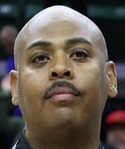 Steve Hall guided Detroit Cass Tech to its first MHSAA Finals championship last season as the Technicians capped a 28-1 run. He’s 160-30 in his eighth season directing Cass Tech, with his team 9-0 this winter, and he has a career high school record of 370-103 having also coached at Detroit Rogers (1996-97 through 2004-05) and Detroit Northwestern (2005-06 through 2007-08). He led Rogers to three straight Class D championships from 2003-05, led Northwestern to its first Detroit Public School League championship in 30 years and Cass Tech to its first in the PSL in 19 seasons. He also coached collegiately as an assistant at Duquesne University (2008-09 through 2011-12) and Youngstown State University (2011-12 through 2014-15) before taking over at Cass Tech for the 2015-16 season. He has received multiple state Coach of the Year awards during his tenures at Rogers and Cass Tech, and also serves the latter as athletic director and boys cross country coach.
Steve Hall guided Detroit Cass Tech to its first MHSAA Finals championship last season as the Technicians capped a 28-1 run. He’s 160-30 in his eighth season directing Cass Tech, with his team 9-0 this winter, and he has a career high school record of 370-103 having also coached at Detroit Rogers (1996-97 through 2004-05) and Detroit Northwestern (2005-06 through 2007-08). He led Rogers to three straight Class D championships from 2003-05, led Northwestern to its first Detroit Public School League championship in 30 years and Cass Tech to its first in the PSL in 19 seasons. He also coached collegiately as an assistant at Duquesne University (2008-09 through 2011-12) and Youngstown State University (2011-12 through 2014-15) before taking over at Cass Tech for the 2015-16 season. He has received multiple state Coach of the Year awards during his tenures at Rogers and Cass Tech, and also serves the latter as athletic director and boys cross country coach.
“My coaching philosophy is ‘Learning Life Skills Through Basketball.’ I have encountered many youngsters that value basketball more than anything. Therefore, I use basketball as a carrot to dangle to help them acquire life skills and other necessities that can benefit them in their lives. Ultimately, when the ball stops bouncing they may be quality fathers, husbands, principals, CEOs, etc., and positive contributors to society. My motto is, “Be better today than yesterday and better tomorrow than today.” My athletic philosophy is scholarships and championships in that order! We love to win. But winning is not only on the scoreboard but also in life. Accountability, Reliability, Dependability and Responsibility. “Do what you are supposed to do, be where you are supposed to be, every play and every day.” God has blessed me with high morals, values and unmatched energy to leave my student athletes better than I found them.”
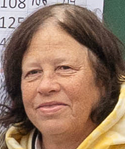 Vicky Kowalski completed her 46th season this fall coaching Farmington Hills Mercy’s girls golf team, and led the program to its second-straight Lower Peninsula Division 2 championship and fourth MHSAA Finals title overall. Her teams also have won seven Regional and 21 league championships and were 220-50 in matches entering the season. She has received several coaching awards over the years including statewide awards from the Michigan Interscholastic Golf Coaches Association (MIGCA) and Michigan High School Coaches Association (MHSCA). Kowalski also is in her 22nd season as Mercy’s girls bowling coach and has coached multiple subvarsity seasons of basketball and volleyball as well. She’s been inducted into Halls of Fame by both MIGCA and the Michigan High School Interscholastic Bowling Coaches Association (MHSIBCA).
Vicky Kowalski completed her 46th season this fall coaching Farmington Hills Mercy’s girls golf team, and led the program to its second-straight Lower Peninsula Division 2 championship and fourth MHSAA Finals title overall. Her teams also have won seven Regional and 21 league championships and were 220-50 in matches entering the season. She has received several coaching awards over the years including statewide awards from the Michigan Interscholastic Golf Coaches Association (MIGCA) and Michigan High School Coaches Association (MHSCA). Kowalski also is in her 22nd season as Mercy’s girls bowling coach and has coached multiple subvarsity seasons of basketball and volleyball as well. She’s been inducted into Halls of Fame by both MIGCA and the Michigan High School Interscholastic Bowling Coaches Association (MHSIBCA).
“I have always believed in participation. On all the teams I have coached, everyone plays – no one sits the bench. All my athletes have their opportunities to grow in the sport. I have always preached dedication and sportsmanship. The athletes practice well to perform well. They encourage teammates as well as competitors. I enjoy interaction with other coaches. We share coaching techniques and ideas for improving team performance.”
Milton “Butch” Briggs has led the East Grand Rapids girls swimming & diving team to a record 26 MHSAA Finals team championships, the first in 1978 and including six straight from 1981-86 and the program’s current three-year title streak. His girls program also has celebrated 105 individual or relay Finals champions and clinched 33 league team titles. Briggs has received several coaching awards, including nationally for his sport (girls and boys combined) from the National High School Athletic Coaches Association (NHSACA) in 2000 and the NFHS Coaches Association for boys swimming & diving in 2011. He entered this past fall season with a dual meet record of 522-65-1 over his career, which has spanned 49 years total, and his boys teams have won 12 MHSAA Finals. Briggs also has served as an assistant track coach at multiple schools and as MISCA president, and is in the MHSCA Hall of Fame.
“My coaching philosophy has been, and continues to be, a work in progress. I have formed relationships with hundreds of amazing young people. They have taught me life lessons in real time and real situations. As a neophyte coach, the experience revolved around winning. We worked together as a team, supported each other in and out of the pool, and won often. Thankfully, I became aware of the value within each athlete. Today, I attempt to interact with each athlete at every team activity and follow their progress in non-swimming endeavors. In short, when I removed my ego from the team's expectations and outcomes, the entire atmosphere was much more enjoyable and productive. And we are still capable of being successful. The Lord has put me in the right place at the right time.”
Six more Michigan coaches earned honors in Section 4. Stefanie Kerska was honored in boys swimming & diving after leading Ann Arbor Pioneer to its third-straight Lower Peninsula Division 1 Finals title under her leadership, and Asa Kelly was recognized in boys track & field after leading Benzie Central to the LPD3 Finals championship. Mt. Morris volleyball coach James Pender was honored after leading his team to the Division 2 Quarterfinals in 2022, when he also eclipsed 1,000 career coaching wins in the sport, and Traverse City St. Francis’ Julie Duffing was awarded in cross country after leading her program to the 2022 LPD3 Finals championship, the program’s second under her leadership. Haslett/Williamston girls lacrosse coach Chad Pastor was honored after leading his team to the Division 2 Semifinals last spring, and Hartland competitive cheer coach Candace Fahr was recognized after leading her team to the MHSAA Finals for the fourth time in her six seasons guiding the program.
The NFHS has been recognizing coaches through an awards program since 1982.

